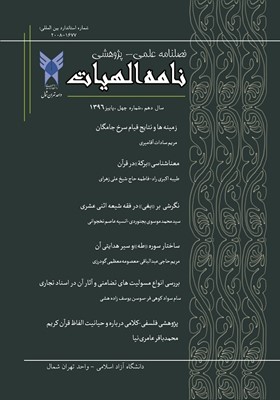بررسی تعلق تأدیه به یکی از چند دین مدیون در فقه و حقوق
محورهای موضوعی : نامه الهیاتمحمد علی سعیدی 1 , علیرضا امیدیان 2 * , حامد نوری 3
1 - استادیار گروه حقوق. دانشگاه علوم اسلامی رضوی. مشهد. ایران
2 - دانشجوی دکترای حقوق خصوصی. دانشگاه علوم اسلامی رضوی. مشهد. ایران
3 - دانشجوی دکترای حقوق جزا و جرم شناسی. جامعه المصطفی. قم. ایران
کلید واژه: مدیون, ایفاء, انتساب تأدیه, سقوط دین, دائن,
چکیده مقاله :
یکی از طرق سقوط تعهدات، ایفاء است. در فقه و حقوق مباحث مختلفی در خصوص ایفاء مطرح شده است، ولی مساله ای که به ذهن می رسد این است که اگر مدیون یک دین از دیون متعدد خود را به دائن پرداخت نماید، ولی مشخصا تعیین نکند تادیه مربوط به کدام دین است، طلب پرداختی بابت کدام دین لحاظ می گردد؟ ماده ۲۸۲ قانون مدنی اجمالا به این سؤال پاسخ داده و اختیار انتساب پرداخت را به مدیون داده است. اما این ماده از این جهت اجمال دارد که اگر مدیون از چنین اختیاری استفاده نکند، تکلیف چیست؟ اجمال ماده مزبور باعث اختلاف نظر حقوق دانان شده است. ماده مذکور از قوانین حقوق فرانسه اقتباس شده و این اختلاف در فقه نیز دیده می شود و هر کدام از فقها نیز دیدگاه متفاوتی در این خصوص دارند. مشهور فقهای امامیه در مساله قائل به اطلاق اختیار انتخاب انتساب مدیون حتی در صورتی که حین ادا تادیه را انتخاب نکند، هستند و ظاهرا ماده 282 قانون مدنی هم بر همین اساس تصویب شده است. به نظر می رسد نمی توان معیار جامعی در این خصوص ارائه نمود و در خصوص هر قضیه باید به امارات و قرائن حاکم توجه کرد. ما در این پژوهش برآنیم تا به بررسی این موضوع در فقه امامیه و حقوق بپردازیم.
One way to break obligations is to fulfill them. In jurisprudence and law, various issues have been raised about performance, but the issue that comes to mind is that if a debtor pays one of his various debts to the creditor, but does not specify which religion the payment belongs to, ask Which religion is paid for? Article 282 of the Civil Code briefly answers this question and gives the debtor the authority to assign the payment. But this article is concise in the sense that if the debtor does not use such an option, what is the obligation? The summary of this article has caused controversy among lawyers. This article is adapted from the laws of French law and this difference is also seen in jurisprudence and each of the jurists has a different view in this regard. Well-known Imami jurists believe in the issue of the authority to choose the assignment of a debtor even if he does not choose payment during the payment, and apparently Article 282 of the Civil Code has been approved on this basis. It seems that a comprehensive criterion can not be provided in this regard, and in each case, the UAE and the prevailing evidence must be considered. In this research, we intend to study this issue in Imami jurisprudence and law.
_||_

